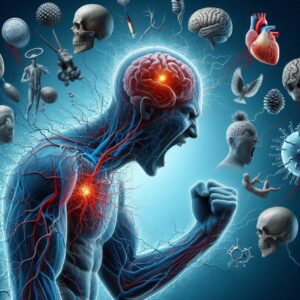Transform Anger into Positive Outcomes: Effective Therapeutic Approaches
Anger is an essential human emotion that everyone experiences throughout their lives. This profound feeling can arise from various circumstances, including experiences of intimidation, personal assaults, frustration, or feelings of betrayal, harm, or insult. Understanding the complex nature of anger is vital for personal development and emotional regulation. By exploring the origins and triggers of this emotion, individuals can embark on a transformative journey towards healthier emotional responses and enhanced mental health.
It is essential to recognize that experiencing anger is not inherently negative; rather, the challenge lies in how we express and manage this emotion. The spectrum of anger expressions—ranging from mild irritation and annoyance to deep-seated resentment and explosive rage—can significantly impact our relationships and overall quality of life. By fostering awareness of these diverse expressions, individuals can skillfully navigate their emotional landscape, ultimately promoting healthier interactions and connections with others.
Physical signs of anger may manifest as a racing heart, increased blood pressure, and heightened muscle tension. If left unaddressed, anger may spiral into destructive behaviors that can adversely affect relationships, career prospects, and overall satisfaction in life. Recognizing the indicators of anger and understanding its root causes are critical steps toward effectively managing this potent emotion, ensuring that it does not dominate one’s life.
Anger triggers can stem from numerous sources, including external events, internal thoughts and feelings, and physiological reactions. By investigating these triggers in depth, individuals can gain profound insights into their anger, laying the groundwork for developing effective coping strategies. This exploration of one’s emotional triggers can significantly enhance personal growth and bolster emotional intelligence, empowering individuals to proactively and constructively manage their feelings in challenging scenarios.
Key Strategies for Mastering Anger Management Skills
- Acknowledge that anger is a normal emotional response that can become problematic if not managed properly.
- Unchecked anger can have severe consequences for one’s mental and physical health.
- Participating in anger management therapy equips individuals with essential tools to manage anger constructively.
- Therapeutic approaches introduce techniques such as deep breathing exercises and enhanced communication skills to tackle emotional hurdles.
- Therapy helps identify personal triggers and the underlying issues that contribute to feelings of anger.
 The Serious Impact of Uncontrolled Anger on Your Health
The Serious Impact of Uncontrolled Anger on Your Health
Exploring the Physical Health Risks Linked to Chronic Anger
Extensive studies have shown a significant connection between prolonged anger and serious health issues. These complications can include elevated blood pressure, heart disease, and weakened immune functionality, all of which heighten the risk of strokes and other critical medical incidents. Furthermore, chronic anger may result in debilitating effects such as irritable bowel syndrome, insomnia, and tension headaches, which can severely disrupt daily life and overall health.
The Ramifications of Unmanaged Anger on Mental Health and Interpersonal Relationships
The repercussions of unmanaged anger extend well beyond physical health, presenting substantial challenges to mental well-being. Persistent anger can serve as a precursor to anxiety disorders, depression, and issues related to substance abuse. Additionally, it can lead to strained relationships, often resulting in conflicts and emotional distancing from loved ones, perpetuating a cycle of isolation and emotional turmoil that can be arduous to overcome.
Recognizing the Importance of Support: Developing Effective Anger Management Skills
Understanding the detrimental effects of uncontrolled anger on both mental and physical health underscores the necessity of seeking help and learning effective anger management techniques. Individuals must face the reality that unchecked anger can threaten their overall well-being. By comprehending the long-term consequences of chronic anger, individuals may feel inspired to actively seek constructive strategies and supportive networks that encourage healthy emotional expression and management.
Uncover the Life-Changing Benefits of Anger Management Therapy
Participating in anger management therapy offers numerous advantages for those struggling with overwhelming feelings of anger. A key benefit is the opportunity to delve into the underlying causes of anger while obtaining practical coping techniques. During therapeutic sessions, clients can explore what specifically triggers their anger, fostering a deeper understanding of their emotional responses and reactions.
This heightened self-awareness is crucial for developing effective anger management techniques. Therapy provides a safe, supportive environment where individuals can reflect on their emotions and learn healthier ways to express and cope with anger. Clients not only gain insights into their emotional states but also acquire essential communication skills that can enhance relationships and minimize conflict. By empowering individuals to regain control over their emotions, anger management therapy can lead to a more balanced, fulfilling life.
Moreover, anger management therapy is instrumental in helping individuals break free from destructive behaviors often associated with uncontrolled anger. By interrupting harmful patterns, clients can reclaim control over their lives and cultivate healthier, more satisfying relationships. Through the application of effective coping methods and stress management techniques, individuals can reduce the negative impacts of anger on their mental and physical health. Ultimately, the transformative benefits of anger management therapy can yield lasting positive changes in an individual’s life.
 Effective Techniques and Strategies Offered in Anger Management Therapy
Effective Techniques and Strategies Offered in Anger Management Therapy
Anger management therapy equips clients with a diverse range of effective techniques and strategies for managing their anger constructively. One commonly used method is deep breathing exercises, which help individuals regulate their physiological responses to anger while alleviating stress and tension. Additionally, mindfulness meditation serves as a powerful technique introduced in therapy, encouraging individuals to focus on the present moment and enhance their awareness of their thoughts and feelings.
Cognitive restructuring is a fundamental component of anger management therapy. This process involves identifying and challenging negative thought patterns, replacing them with more rational and balanced perspectives. By reframing their understanding of triggering situations, individuals can learn to respond to anger in a more productive way. Furthermore, therapy often includes problem-solving skills designed to help clients effectively confront the root causes of their anger.
Moreover, assertiveness training is frequently integrated into anger management therapy, empowering individuals to express their needs and establish healthy boundaries respectfully. Those who master these techniques and strategies in therapy develop a versatile toolkit for managing their anger in various contexts, ultimately enhancing their adaptability and emotional resilience.
Dive Deep: Uncovering the Triggers and Roots of Anger Through Therapeutic Exploration
Therapeutic sessions provide individuals with the opportunity to explore the specific triggers and underlying issues contributing to their anger. Through reflection on a variety of situations, thoughts, and emotions, clients can gain valuable insights into what ignites their anger. Recognizing these triggers enables individuals to identify early warning signs before they escalate into uncontrollable rage.
Therapy acts as a crucial resource for those eager to identify their anger triggers and address the core issues driving these feelings. This process may involve examining past experiences, traumas, or learned behaviors that shape one’s emotional responses. Effectively confronting these underlying factors can result in significant breakthroughs in healing emotional wounds, ultimately fostering a greater sense of peace and emotional stability.
Within a therapeutic environment, individuals are offered a safe space to delve into their triggers and underlying concerns without fear of judgment or criticism. This journey of self-discovery can be empowering, equipping clients with the necessary tools to manage and channel their anger in healthy and constructive ways.
The Crucial Role of Cognitive Behavioral Therapy in Successful Anger Management
Confronting and Correcting Irrational Beliefs to Promote Rational Thinking
Cognitive Behavioral Therapy (CBT) focuses on challenging irrational beliefs and replacing them with logical, balanced thought processes. By pinpointing and addressing these cognitive distortions, individuals can cultivate a more constructive and realistic perspective regarding situations that trigger their anger, leading to healthier emotional reactions.
Gaining Practical Coping Strategies for Everyday Anger Management
Beyond merely recognizing cognitive distortions, CBT empowers individuals with practical coping strategies for effectively managing anger. Techniques such as relaxation exercises, assertiveness training, and problem-solving skills are essential for addressing the root causes of anger. These strategies equip individuals with actionable tools that can be employed in daily situations to help regulate and manage their emotional responses.
Boosting Self-Awareness for Enhanced Emotional Regulation
Furthermore, CBT enhances self-awareness by helping individuals comprehend the connections between their thoughts, emotions, and behaviors. By gaining clarity about these relationships, individuals are better prepared to manage their emotional reactions to anger-triggering scenarios. Achieving effective anger management is vital for fostering emotional regulation and overall well-being, with Cognitive Behavioral Therapy playing a significant role in this process by providing individuals with the skills necessary to navigate their anger and improve their quality of life.
 Ensuring Lasting Success: Ongoing Support and Resources After Therapy
Ensuring Lasting Success: Ongoing Support and Resources After Therapy
For individuals who have completed anger management therapy, it is crucial to continue seeking support and utilizing resources to sustain their personal development. To further bolster their anger management skills, individuals may consider joining support groups or engaging in one-on-one counseling sessions. Support groups provide an excellent opportunity to connect with others facing similar challenges, fostering a sense of community and understanding. These groups create a space for sharing experiences and learning from each other, helping to alleviate feelings of isolation and cultivate a sense of belonging.
In addition to ongoing support, individuals can benefit from various resources, including self-help literature, online platforms, and mobile applications designed to facilitate effective anger management. These tools offer additional strategies and methods for practicing healthy coping mechanisms outside of therapy sessions. Furthermore, maintaining progress after therapy may necessitate lifestyle changes that promote overall well-being, such as regular physical activity, balanced nutrition, sufficient sleep, and stress-reduction techniques.
Incorporating these lifestyle adjustments into daily routines can significantly diminish the likelihood of experiencing overwhelming anger. Understanding and managing the powerful emotion of anger is vital for maintaining personal control. The repercussions of uncontrolled anger can severely affect both mental and physical health, emphasizing the importance of seeking assistance through anger management therapy. This comprehensive understanding equips individuals with the knowledge needed to navigate their emotions effectively.
Therapy serves as a critical resource for those grappling with the complexities of uncontrolled anger. It empowers individuals to understand their emotional triggers, confront underlying issues, and acquire practical strategies while providing essential support for sustained progress. By equipping individuals with the knowledge and tools to manage their anger, therapy fosters healthier coping mechanisms and promotes overall emotional well-being.
Presented By:
References
- Teen Addiction Treatment Ames Iowa | Ember Recovery. https://emberrecovery.org/teen-addiction-treatment-in-iowa/
- Why Men Should Not Cover Up Their Emotional Distress | TheBeardMag. https://www.thebeardmag.com/lifestyle/health/why-men-should-not-cover-up-their-emotional-distress/
The Article: Interventions for Anger Management appeared first on Anger Management Leyland.
The Article Managing Anger: Proven Strategies for Success appeared first on https://mcrtherapies.com
The Article Proven Strategies for Success in Managing Anger Was Found On https://limitsofstrategy.com

 The Role of Therapy in Mastering Anger
The Role of Therapy in Mastering Anger Mindfulness and Meditation in Anger Control Therapy
Mindfulness and Meditation in Anger Control Therapy
 Techniques and Strategies Taught in Anger Management Therapy
Techniques and Strategies Taught in Anger Management Therapy Maintaining Progress: Continuing Support and Resources After Therapy
Maintaining Progress: Continuing Support and Resources After Therapy